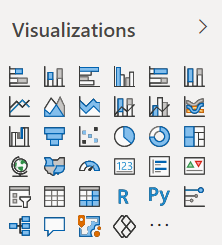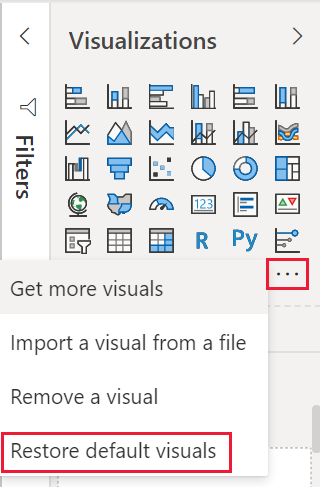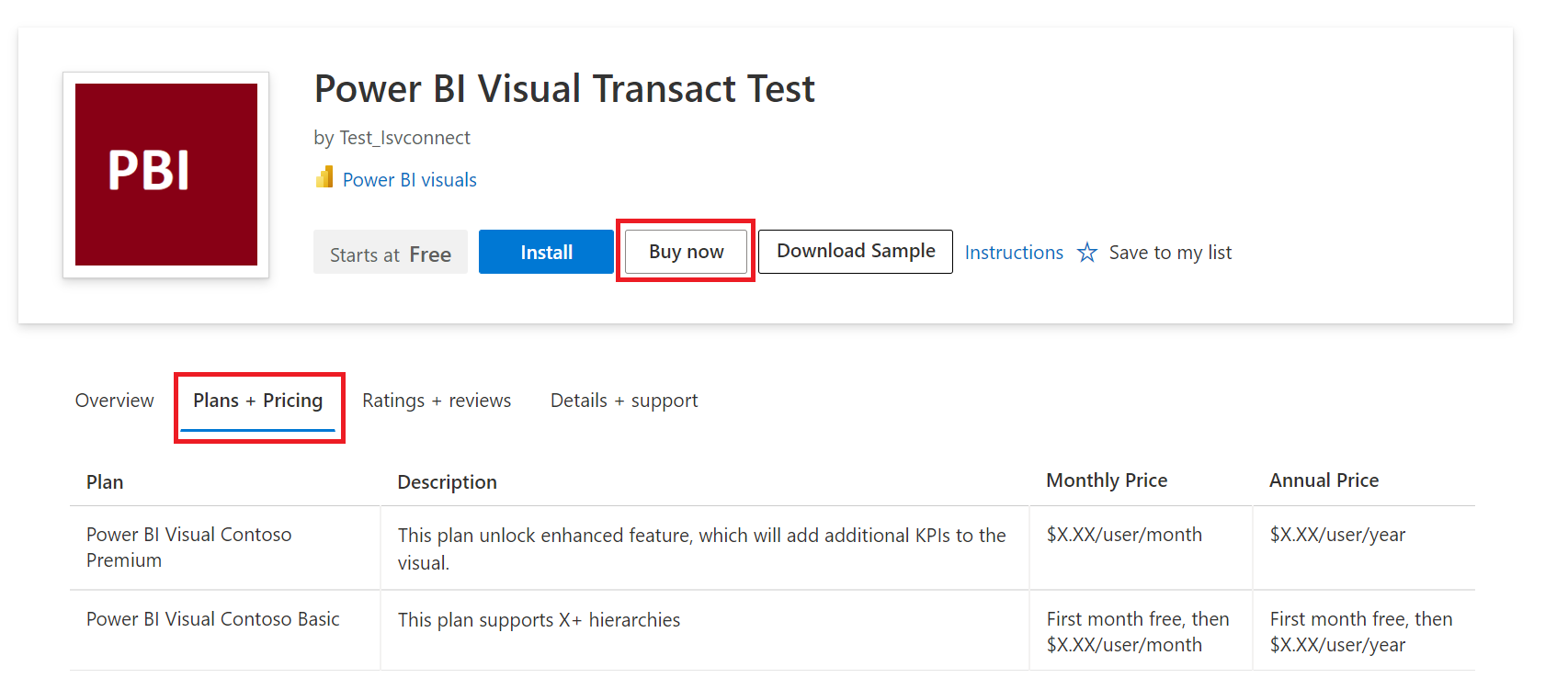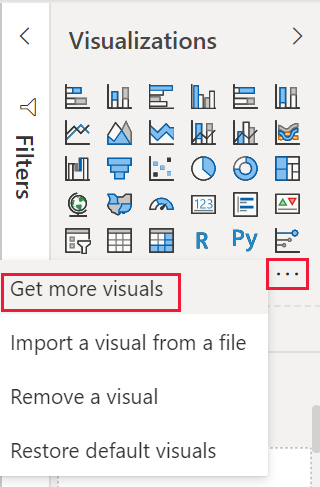What are custom visuals in Power BI and where can I get them?
Power BI visuals come from three main sources:
- Core visuals are readily available on the visualization pane.
- You can download or import visuals from Microsoft AppSource or Power BI.
- You can create your own custom visuals.
Core Power BI visuals
Power BI comes with many out-of-the box visuals. These Power BI visuals are available in the visualization pane of both Power BI Desktop and Power BI service, and can be used for creating and editing Power BI content.

To remove a Power BI visual from the visualization pane, right-click it and select unpin.
To restore the default Power BI visuals in the visualization pane, select the ellipsis and then select Restore default visuals.

AppSource Power BI visuals
You can find many more Power BI visuals in AppSource. AppSource is the place to find apps, add-ins, and extensions for your Microsoft software. It connects millions of people who use products such as Microsoft 365, Azure, Dynamics 365, Cortana, and Power BI, to solutions that help them work more efficiently and with more insight than before.
Microsoft and community members develop Power BI visuals for public benefit, and publish them to the AppSource. Microsoft tests and approves these Power BI visuals for functionality and quality. You can download these visuals and add them to your Power BI reports.
Note
- By using Power BI visuals created with our SDK, you may be importing data from, or sending data to, a third party or other service outside of your Power BI tenant’s geographic area, compliance boundary, or national/regional cloud instance.
- Once Power BI visuals from AppSource are imported, they may be updated automatically without any additional notice.
Download from AppSource
Downloading visuals from AppSource is free, but each publisher defines their own business and licensing model for their visual. There are three basic types of payment and licensing plans:
Free visuals that you can download and use without additional costs. These visuals are labeled as Free.
Licensed visuals managed from the Microsoft 365 admin center. These visuals are available in a limited capacity for free with the option to purchase more features. Transactability happens in AppSource by clicking on the Buy now button.
Visuals that you can download with basic functionality for free, but have additional features available for pay. These visuals have the additional purchase may be required label. You can often get a free trial period to test out the full functionality of the visual before paying for it. Transactability and license management for these visuals happen outside of Microsoft platforms.
Once you select the visual, select the Plans + Pricing tab to see the plan for that visual. Pricing information is also shown on the left pane.

Select Add to download the visual. If a free trial period is offered, it will start when you download the visual.
After you purchase the licenses for the visual in AppSource with a credit card, you need to assign them to yourself or others in the Microsoft 365 admin center.
For more information on how to assign licenses see Licensing and transactability enforcement.
To see how licenses are enforced, see custom visual licenses
More questions about assigning and managing licenses?
Certified Power BI visuals
Certified Power BI visuals are visuals in AppSource that meet certain specified code requirements that the Microsoft Power BI team has tested and approved. The tests are designed to check that the visual doesn't access external services or resources.
To view the list of certified Power BI visuals, go to AppSource. To submit your own visual for certification, see Certified Power BI visuals.
Sample reports for Power BI visuals
Each Power BI visual on AppSource has a sample report you can download that illustrates how the visual works. To download the sample report, in the AppSource select a Power BI visual and select the Download Sample link.
Organizational store
Power BI admins can approve and deploy Power BI custom visuals for their organization. Report authors can easily discover, update, and use these Power BI visuals. Admins can easily manage these visuals with actions such as updating versions, disabling and enabling Power BI visuals.

To access the organizational store, in the Visualization pane select the ellipsis, then select Get more visuals.

When the Power BI visuals window appears, select the My organization tab.
Read more about organizational visuals.
Custom visual files
You can also develop your own custom Power BI visual, to be used by you, your organization, or the entire Power BI community.
Power BI visuals come in .pbiviz file packages that include code for rendering the data served to them. Anyone can create a custom visual and package it as a .pbiviz file that can then be imported into a Power BI report.
To import a Power BI visual from a file, see Import a visual file from your local computer into Power BI.
If you're a web developer and want to create your own visual and add it to AppSource, you can learn how to develop a Power BI visual and publish a custom visual to AppSource.
Warning
A Power BI custom visual could contain code with security or privacy risks. Make sure you trust the author and source before importing it to your report.
For some examples of Power BI custom visuals available for downloading on github, see Examples of Power BI visuals.
Considerations and limitations
Licensed visuals aren't supported in the following environments. Therefore, if licensed visuals are used in these environments, Power BI can't tell the ISV if the user is licensed, nor will it block the visual.
- RS (report server) - no Microsoft Entra ID
- Sovereign or government clouds
- PaaS Power BI embedded App owns data
- Publish to web (P2W)
Related content
- Develop a Power BI circle card visual
- Power BI visuals project structure
- Guidelines for Power BI visuals
- Examples of Power BI visuals
More questions? try the Power BI Community